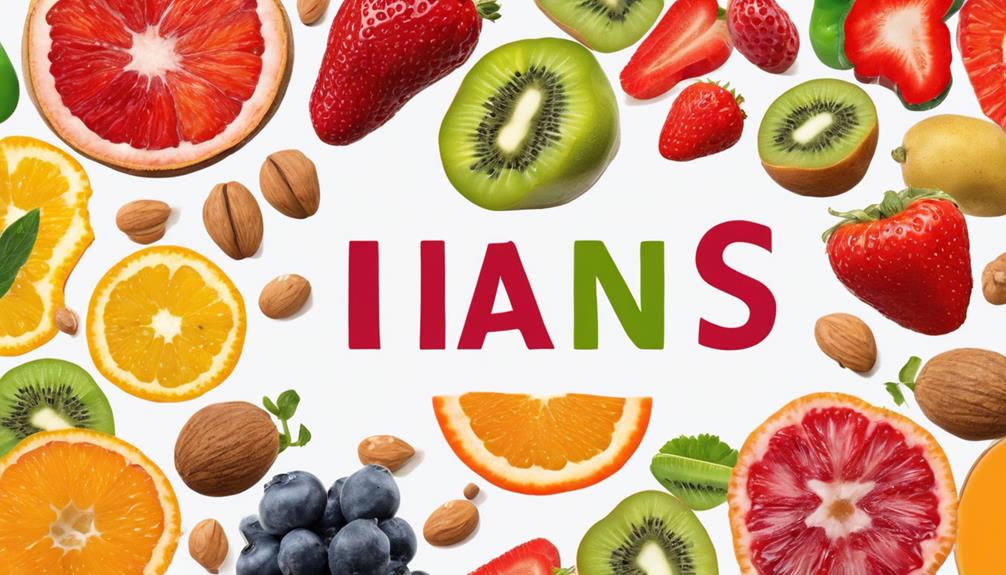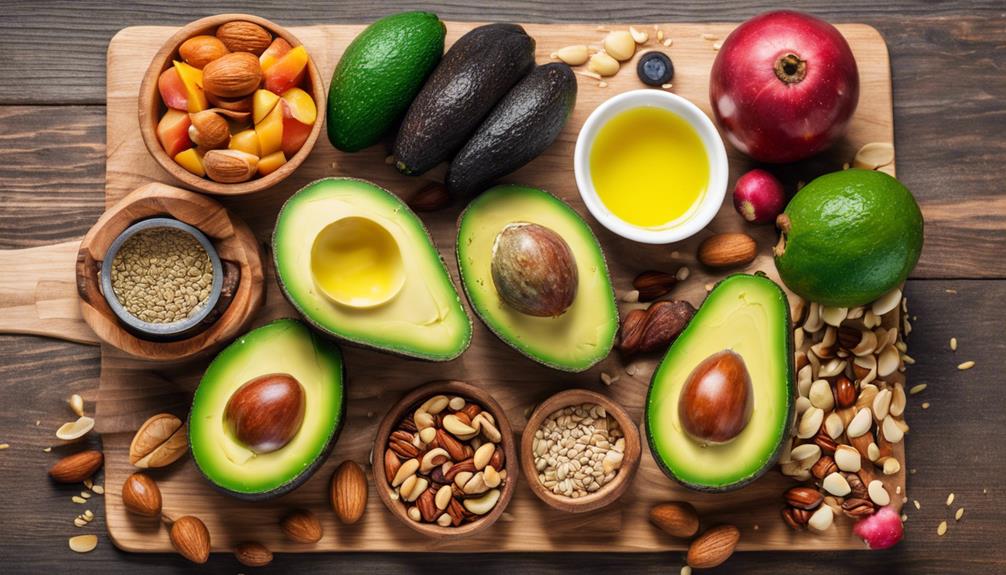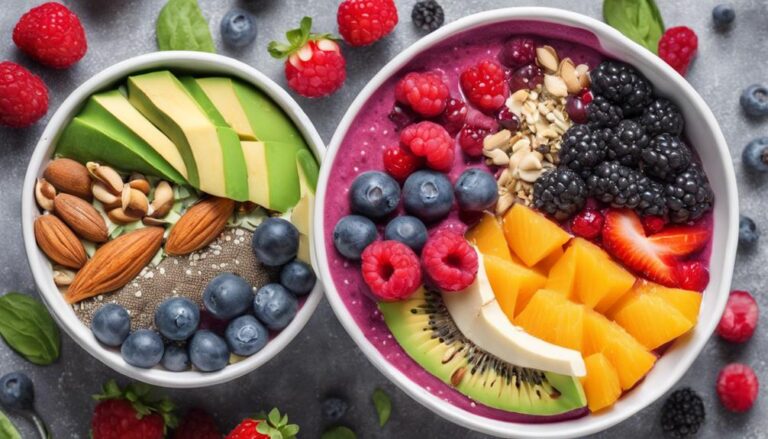How to Fight Free Radicals
To combat the impact of free radicals on your health, it's crucial to understand how certain lifestyle choices can help neutralize their harmful effects. By addressing the root cause of oxidative stress, you can take proactive steps towards enhancing your overall well-being. Explore the strategies and dietary changes that can aid in your fight against free radicals, empowering you to make informed decisions for a healthier future.
Key Takeaways
- Increase antioxidants to neutralize free radicals.
- Incorporate vitamin C and E-rich foods into diet.
- Embrace phytonutrients from plant-based foods.
- Manage stress levels for reduced free radical impact.
- Limit sugar intake to decrease oxidative stress.
Understanding Free Radicals
If you've ever wondered about the buzz surrounding antioxidants, it all comes down to combating free radicals. Free radicals are unstable molecules that can cause cellular damage through a process known as oxidative stress. Picture them as tiny troublemakers in your body, disrupting the harmony of your cells.
When left unchecked, these free radicals can wreak havoc on your health by damaging important cellular components like DNA and proteins.
Oxidative stress, caused by an imbalance between free radicals and antioxidants in your body, is linked to various diseases like cancer, heart disease, and aging. It's like a tug-of-war between the good guys (antioxidants) and the villains (free radicals), with your cells caught in the middle.
Understanding the impact of free radicals and oxidative stress on your body is crucial for maintaining optimal health. By incorporating antioxidant-rich foods and habits into your lifestyle, you can help combat these troublemakers and protect your cells from harm.
Antioxidants and Their Importance
Antioxidants play a crucial role in your body's defense against the harmful effects of free radicals. These powerful compounds help neutralize and stabilize free radicals, reducing their potential damage to cells and tissues. By incorporating antioxidant-rich foods into your diet, you can enhance your body's natural defense system and promote overall health.
The benefits of antioxidants are vast. They not only combat oxidative stress but also support healthy aging, boost immunity, and reduce the risk of chronic diseases like heart disease and cancer. Some common antioxidants include vitamins C and E, beta-carotene, and selenium.
To ensure you're getting an ample supply of antioxidants, include a variety of colorful fruits and vegetables in your meals. Berries, citrus fruits, leafy greens, nuts, seeds, and whole grains are excellent food sources of antioxidants. Additionally, herbs and spices like turmeric, cinnamon, and oregano are rich in these beneficial compounds.
Boost Your Vitamin C Intake
To enhance your body's defense against free radicals and bolster your overall health, increasing your intake of vitamin C is a smart choice. Vitamin C is a powerful antioxidant that supports your immune system and plays a crucial role in collagen production, essential for skin health and wound healing. Citrus fruits like oranges, lemons, and grapefruits are excellent natural sources of vitamin C. However, if you struggle to consume enough through your diet, supplements can be a convenient option.
| Vitamin C Sources | Benefits |
|---|---|
| Citrus Fruits | Rich in vitamin C and other essential nutrients |
| Supplements | Convenient way to ensure adequate intake |
Including vitamin C-rich foods in your daily meals or taking supplements can help you maintain optimal levels of this vital nutrient, supporting your immune function and promoting healthy skin. Remember, a balanced diet rich in antioxidants like vitamin C is key to combating free radicals and promoting overall well-being.
Incorporate Vitamin E-Rich Foods
Boosting your body's defense against free radicals goes beyond just vitamin C. Incorporating vitamin E-rich foods into your diet can further enhance your skin health and provide crucial support for your immune system. Vitamin E is a powerful antioxidant that helps protect your cells from damage caused by free radicals, which can contribute to premature aging and various health issues.
To incorporate more vitamin E into your diet, consider adding foods like almonds, sunflower seeds, spinach, avocado, and butternut squash to your meals. These delicious options not only taste great but also offer a range of other nutrients that benefit your overall health.
Power of Phytonutrients
While many people are aware of the importance of vitamins like C and E in fighting free radicals, another crucial group of compounds that play a significant role in maintaining your health are phytonutrients. Phytonutrients are natural chemicals found in plants that help protect them from environmental threats and can also benefit your health. Including a variety of plant-based foods in your diet ensures you get a wide range of phytonutrients, which can provide powerful antioxidant effects and support your immune system.
Plant-based diets rich in phytonutrients have been linked to numerous health benefits, including reduced inflammation, improved heart health, and a lower risk of chronic diseases. These compounds not only help combat free radicals but also promote overall wellness.
Stay Hydrated With Water
Staying hydrated is essential for maintaining optimal bodily functions and overall health. Water is crucial for maintaining electrolyte balance, which is essential for nerve function, muscle contraction, and fluid balance within your cells. By staying hydrated, you support your body's ability to transport nutrients, regulate temperature, and remove waste products effectively.
In addition to internal benefits, adequate water intake also plays a significant role in skin hydration. Dehydrated skin can appear dry, dull, and even lead to premature aging. When you drink enough water, you help your skin maintain its elasticity, glow, and overall health.
To ensure you stay hydrated throughout the day, carry a reusable water bottle with you and sip on it regularly. Aim to drink at least eight 8-ounce glasses of water daily, adjusting based on your activity level and climate. By prioritizing hydration, you support your body in functioning optimally and maintaining healthy skin.
Get Moving With Exercise
Hydration is key to supporting your body's functions and maintaining healthy skin. When it comes to fighting free radicals, incorporating exercise into your routine is crucial. High-intensity workouts and resistance training are especially effective in combatting oxidative stress and boosting your body's antioxidant defenses.
Here's a quick breakdown of the benefits of these exercise types:
| Exercise Type | Benefits | Duration |
|---|---|---|
| High Intensity | Increases oxygen consumption and metabolism | 20-30 minutes |
| Resistance Training | Builds muscle mass and strength | 3-4 times/week |
| Long walks | Improves cardiovascular health and circulation | 30-60 minutes |
| Yoga | Reduces stress and promotes flexibility | 45-60 minutes |
| Dancing | Enhances mood and coordination | 30-45 minutes |
Quality Sleep for Cellular Repair
For optimal cellular repair and overall well-being, prioritizing quality sleep is essential. Sleep quality directly impacts the body's ability to repair and regenerate cells, crucial for maintaining optimal health. During deep sleep stages, the body releases growth hormones that aid in cellular repair, strengthening the immune system, and promoting overall wellness. Lack of quality sleep can hinder these processes, leading to increased oxidative stress and a compromised immune response.
To ensure you're getting the best quality sleep for effective cellular repair, establish a consistent sleep routine, aiming for 7-9 hours of uninterrupted rest each night. Create a relaxing bedtime routine, such as reading a book or taking a warm bath, to signal to your body that it's time to wind down. Keep your bedroom dark, cool, and free from distractions to promote deep, restorative sleep.
Prioritizing sleep quality is a powerful way to support your body's natural ability to repair and renew cells, ultimately contributing to your overall health and well-being.
Reduce Stress Levels
To effectively combat the negative impact of free radicals on your body, reducing stress levels is a crucial step in promoting overall health and well-being. Stress not only affects your mental state but can also have physical repercussions, contributing to the production of harmful free radicals in your body.
Incorporating mindful meditation into your daily routine can be a powerful tool to help reduce stress. This practice encourages you to focus on the present moment, calming your mind and allowing you to let go of worries that may be contributing to your stress levels.
Additionally, relaxation techniques such as deep breathing exercises, progressive muscle relaxation, and visualization can all help lower stress levels and combat the effects of free radicals. By prioritizing stress reduction through these practices, you can support your body's natural defense mechanisms and promote overall wellness.
Limit Processed Sugar Intake
Managing your sugar intake is a key aspect of maintaining optimal health and reducing the negative impact of free radicals on your body. Processed sugars not only provide empty calories but can also lead to inflammation and oxidative stress in your cells. To combat this, consider incorporating sugar alternatives like honey, maple syrup, or stevia in your diet. These options can satisfy your sweet tooth without causing the same harmful effects as refined sugars.
If you're looking to kick your sugar habit altogether, a sugar detox might be beneficial. This involves eliminating sources of added sugars from your diet for a period of time to reset your taste buds and decrease cravings.
Focus on whole foods like fruits, vegetables, lean proteins, and whole grains to naturally sweeten your meals without the need for processed sugars.
Embrace Healthy Fats
When it comes to combating free radicals and promoting overall health, embracing healthy fats is a crucial step in your journey. Cooking oils, such as olive oil and avocado oil, are rich in monounsaturated fats that can help reduce inflammation and protect your cells from oxidative stress caused by free radicals. Including these oils in your daily cooking not only adds flavor but also provides essential nutrients for your body.
Nut butters, like almond butter and peanut butter, are another excellent source of healthy fats. They contain heart-healthy unsaturated fats that support brain function and help maintain healthy skin. Spread nut butter on whole grain toast or add a dollop to your smoothie for a delicious and nutritious boost of fats.
Herbal Teas and Their Benefits
For those seeking a comforting and health-promoting beverage option, herbal teas offer a delightful solution. These tea varieties, such as chamomile, peppermint, and ginger, not only provide a soothing experience but also come with a range of health benefits.
Chamomile tea, known for its calming properties, can aid in reducing inflammation and promoting better sleep.
Peppermint tea, with its refreshing flavor, is excellent for digestion and can help alleviate bloating.
Ginger tea, with its spicy kick, is a powerhouse of antioxidants that can support immune function and reduce nausea.
In addition to their delicious flavors, herbal teas are packed with antioxidants and phytonutrients that combat free radicals in the body. These compounds help reduce oxidative stress, lower inflammation, and protect cells from damage. By incorporating herbal teas into your daily routine, you can enjoy a tasty way to boost your overall health and well-being.
Frequently Asked Questions
Can Free Radicals Cause Premature Aging?
Yes, free radicals can indeed cause premature aging by damaging skin cells. To combat this, focus on skin protection through antioxidants and anti-aging strategies like using sunscreen daily, eating a balanced diet, and staying hydrated.
How Can I Increase My Antioxidant Levels Naturally?
To boost antioxidant levels naturally, focus on antioxidant-rich foods like berries, nuts, and leafy greens. Incorporate lifestyle changes such as regular exercise and reducing stress. These simple adjustments can enhance your body's defense against free radicals.
What Are the Best Sources of Vitamin E?
To boost your Vitamin E benefits, turn to rich sources like almonds, sunflower seeds, and spinach. These foods are not only delicious but also packed with antioxidants that can help fight free radicals and keep you healthy.
Are There Specific Phytonutrients That Target Free Radicals?
You can find specific phytonutrients that are antioxidant powerhouses and free radical fighters in colorful fruits and vegetables. These compounds, like anthocyanins in blueberries and lycopene in tomatoes, help combat oxidative stress in your body.
Does Dehydration Worsen the Effects of Free Radicals?
Staying hydrated is crucial for fighting free radicals as dehydration can worsen their effects. Adequate hydration levels help protect your skin from oxidative stress, making it essential to drink plenty of water daily for overall health and skin protection.
Conclusion
In conclusion, by incorporating a diet rich in antioxidants like vitamin C and E, along with phytonutrients and stress-reducing techniques, you can effectively combat free radicals and reduce oxidative stress in your body. Remember to prioritize whole foods, limit processed sugars, and embrace healthy fats to support overall health and well-being. By taking these steps, you can protect your cells from damage and promote a strong immune system.















